Analysis of Assessment Tasks for Dementia Care Training Module
VerifiedAdded on 2020/05/28
|25
|10566
|424
AI Summary
This assessment task is designed for students enrolled in the Certificate III in Individual Support (Ageing, Home and Community) program. The primary objective is to evaluate effective stress management strategies that can be employed when supporting individuals living with dementia. Participants are required to identify potential stressors, both external and internal, associated with caring for people with dementia. Furthermore, they must describe at least six physical, behavioral, or emotional responses to stress and outline four self-care strategies to manage these stresses. The task emphasizes the importance of maintaining personal well-being while providing care, ensuring that students can apply theoretical knowledge in practical scenarios. By completing this assessment, students will enhance their ability to recognize signs of stress in themselves and others, and implement effective strategies to mitigate its impact, thereby improving the quality of support provided to individuals with dementia.
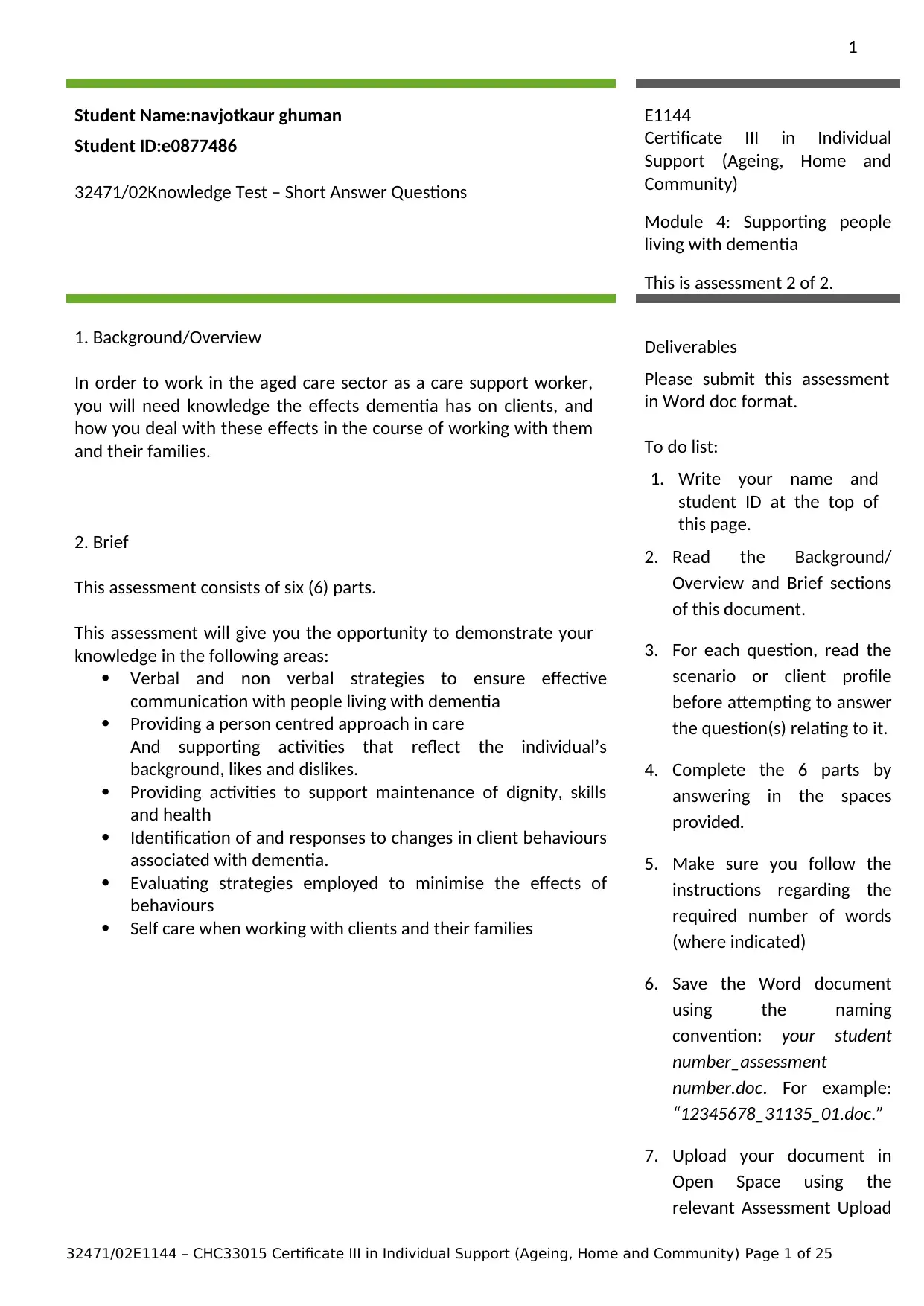
1
Student Name:navjotkaur ghuman
Student ID:e0877486
32471/02Knowledge Test – Short Answer Questions
E1144
Certificate III in Individual
Support (Ageing, Home and
Community)
Module 4: Supporting people
living with dementia
This is assessment 2 of 2.
1. Background/Overview
In order to work in the aged care sector as a care support worker,
you will need knowledge the effects dementia has on clients, and
how you deal with these effects in the course of working with them
and their families.
2. Brief
This assessment consists of six (6) parts.
This assessment will give you the opportunity to demonstrate your
knowledge in the following areas:
Verbal and non verbal strategies to ensure effective
communication with people living with dementia
Providing a person centred approach in care
And supporting activities that reflect the individual’s
background, likes and dislikes.
Providing activities to support maintenance of dignity, skills
and health
Identification of and responses to changes in client behaviours
associated with dementia.
Evaluating strategies employed to minimise the effects of
behaviours
Self care when working with clients and their families
Deliverables
Please submit this assessment
in Word doc format.
To do list:
1. Write your name and
student ID at the top of
this page.
2. Read the Background/
Overview and Brief sections
of this document.
3. For each question, read the
scenario or client profile
before attempting to answer
the question(s) relating to it.
4. Complete the 6 parts by
answering in the spaces
provided.
5. Make sure you follow the
instructions regarding the
required number of words
(where indicated)
6. Save the Word document
using the naming
convention: your student
number_assessment
number.doc. For example:
“12345678_31135_01.doc.”
7. Upload your document in
Open Space using the
relevant Assessment Upload
32471/02E1144 – CHC33015 Certificate III in Individual Support (Ageing, Home and Community) Page 1 of 25
Student Name:navjotkaur ghuman
Student ID:e0877486
32471/02Knowledge Test – Short Answer Questions
E1144
Certificate III in Individual
Support (Ageing, Home and
Community)
Module 4: Supporting people
living with dementia
This is assessment 2 of 2.
1. Background/Overview
In order to work in the aged care sector as a care support worker,
you will need knowledge the effects dementia has on clients, and
how you deal with these effects in the course of working with them
and their families.
2. Brief
This assessment consists of six (6) parts.
This assessment will give you the opportunity to demonstrate your
knowledge in the following areas:
Verbal and non verbal strategies to ensure effective
communication with people living with dementia
Providing a person centred approach in care
And supporting activities that reflect the individual’s
background, likes and dislikes.
Providing activities to support maintenance of dignity, skills
and health
Identification of and responses to changes in client behaviours
associated with dementia.
Evaluating strategies employed to minimise the effects of
behaviours
Self care when working with clients and their families
Deliverables
Please submit this assessment
in Word doc format.
To do list:
1. Write your name and
student ID at the top of
this page.
2. Read the Background/
Overview and Brief sections
of this document.
3. For each question, read the
scenario or client profile
before attempting to answer
the question(s) relating to it.
4. Complete the 6 parts by
answering in the spaces
provided.
5. Make sure you follow the
instructions regarding the
required number of words
(where indicated)
6. Save the Word document
using the naming
convention: your student
number_assessment
number.doc. For example:
“12345678_31135_01.doc.”
7. Upload your document in
Open Space using the
relevant Assessment Upload
32471/02E1144 – CHC33015 Certificate III in Individual Support (Ageing, Home and Community) Page 1 of 25
Paraphrase This Document
Need a fresh take? Get an instant paraphrase of this document with our AI Paraphraser
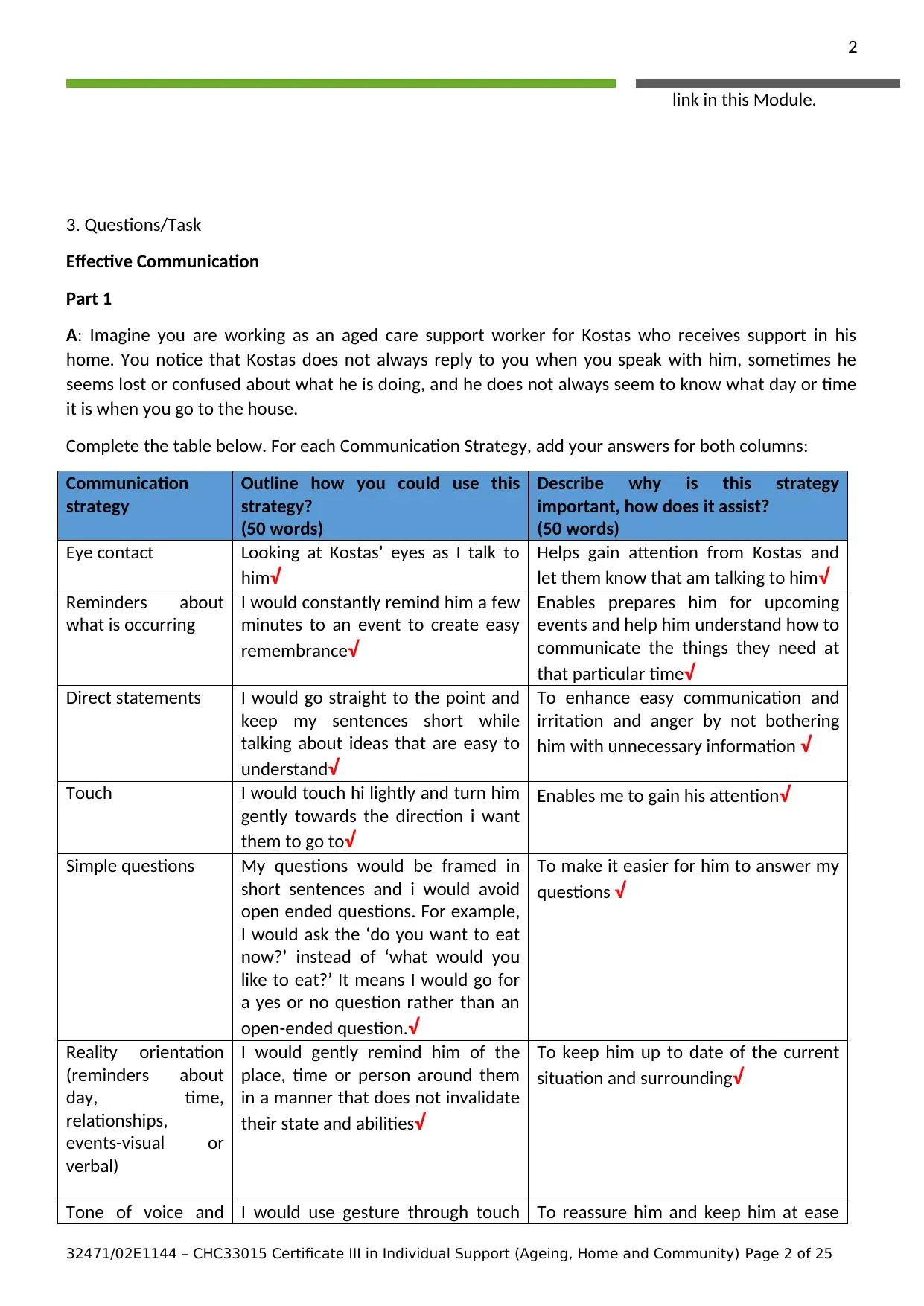
2
link in this Module.
3. Questions/Task
Effective Communication
Part 1
A: Imagine you are working as an aged care support worker for Kostas who receives support in his
home. You notice that Kostas does not always reply to you when you speak with him, sometimes he
seems lost or confused about what he is doing, and he does not always seem to know what day or time
it is when you go to the house.
Complete the table below. For each Communication Strategy, add your answers for both columns:
Communication
strategy
Outline how you could use this
strategy?
(50 words)
Describe why is this strategy
important, how does it assist?
(50 words)
Eye contact Looking at Kostas’ eyes as I talk to
him√
Helps gain attention from Kostas and
let them know that am talking to him√
Reminders about
what is occurring
I would constantly remind him a few
minutes to an event to create easy
remembrance√
Enables prepares him for upcoming
events and help him understand how to
communicate the things they need at
that particular time√
Direct statements I would go straight to the point and
keep my sentences short while
talking about ideas that are easy to
understand√
To enhance easy communication and
irritation and anger by not bothering
him with unnecessary information √
Touch I would touch hi lightly and turn him
gently towards the direction i want
them to go to√
Enables me to gain his attention√
Simple questions My questions would be framed in
short sentences and i would avoid
open ended questions. For example,
I would ask the ‘do you want to eat
now?’ instead of ‘what would you
like to eat?’ It means I would go for
a yes or no question rather than an
open-ended question.√
To make it easier for him to answer my
questions √
Reality orientation
(reminders about
day, time,
relationships,
events-visual or
verbal)
I would gently remind him of the
place, time or person around them
in a manner that does not invalidate
their state and abilities√
To keep him up to date of the current
situation and surrounding√
Tone of voice and I would use gesture through touch To reassure him and keep him at ease
32471/02E1144 – CHC33015 Certificate III in Individual Support (Ageing, Home and Community) Page 2 of 25
link in this Module.
3. Questions/Task
Effective Communication
Part 1
A: Imagine you are working as an aged care support worker for Kostas who receives support in his
home. You notice that Kostas does not always reply to you when you speak with him, sometimes he
seems lost or confused about what he is doing, and he does not always seem to know what day or time
it is when you go to the house.
Complete the table below. For each Communication Strategy, add your answers for both columns:
Communication
strategy
Outline how you could use this
strategy?
(50 words)
Describe why is this strategy
important, how does it assist?
(50 words)
Eye contact Looking at Kostas’ eyes as I talk to
him√
Helps gain attention from Kostas and
let them know that am talking to him√
Reminders about
what is occurring
I would constantly remind him a few
minutes to an event to create easy
remembrance√
Enables prepares him for upcoming
events and help him understand how to
communicate the things they need at
that particular time√
Direct statements I would go straight to the point and
keep my sentences short while
talking about ideas that are easy to
understand√
To enhance easy communication and
irritation and anger by not bothering
him with unnecessary information √
Touch I would touch hi lightly and turn him
gently towards the direction i want
them to go to√
Enables me to gain his attention√
Simple questions My questions would be framed in
short sentences and i would avoid
open ended questions. For example,
I would ask the ‘do you want to eat
now?’ instead of ‘what would you
like to eat?’ It means I would go for
a yes or no question rather than an
open-ended question.√
To make it easier for him to answer my
questions √
Reality orientation
(reminders about
day, time,
relationships,
events-visual or
verbal)
I would gently remind him of the
place, time or person around them
in a manner that does not invalidate
their state and abilities√
To keep him up to date of the current
situation and surrounding√
Tone of voice and I would use gesture through touch To reassure him and keep him at ease
32471/02E1144 – CHC33015 Certificate III in Individual Support (Ageing, Home and Community) Page 2 of 25
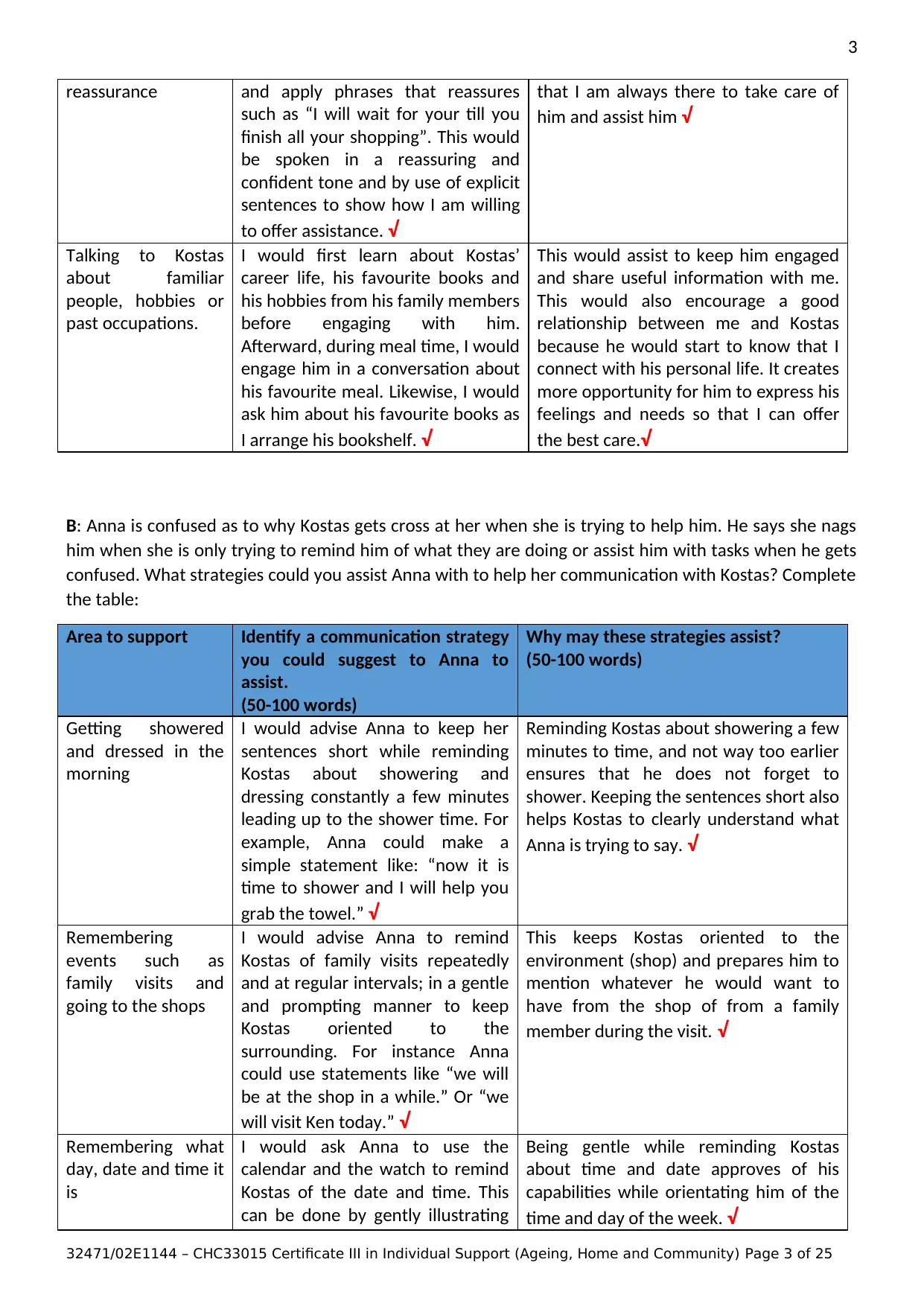
3
reassurance and apply phrases that reassures
such as “I will wait for your till you
finish all your shopping”. This would
be spoken in a reassuring and
confident tone and by use of explicit
sentences to show how I am willing
to offer assistance. √
that I am always there to take care of
him and assist him √
Talking to Kostas
about familiar
people, hobbies or
past occupations.
I would first learn about Kostas’
career life, his favourite books and
his hobbies from his family members
before engaging with him.
Afterward, during meal time, I would
engage him in a conversation about
his favourite meal. Likewise, I would
ask him about his favourite books as
I arrange his bookshelf. √
This would assist to keep him engaged
and share useful information with me.
This would also encourage a good
relationship between me and Kostas
because he would start to know that I
connect with his personal life. It creates
more opportunity for him to express his
feelings and needs so that I can offer
the best care.√
B: Anna is confused as to why Kostas gets cross at her when she is trying to help him. He says she nags
him when she is only trying to remind him of what they are doing or assist him with tasks when he gets
confused. What strategies could you assist Anna with to help her communication with Kostas? Complete
the table:
Area to support Identify a communication strategy
you could suggest to Anna to
assist.
(50-100 words)
Why may these strategies assist?
(50-100 words)
Getting showered
and dressed in the
morning
I would advise Anna to keep her
sentences short while reminding
Kostas about showering and
dressing constantly a few minutes
leading up to the shower time. For
example, Anna could make a
simple statement like: “now it is
time to shower and I will help you
grab the towel.” √
Reminding Kostas about showering a few
minutes to time, and not way too earlier
ensures that he does not forget to
shower. Keeping the sentences short also
helps Kostas to clearly understand what
Anna is trying to say. √
Remembering
events such as
family visits and
going to the shops
I would advise Anna to remind
Kostas of family visits repeatedly
and at regular intervals; in a gentle
and prompting manner to keep
Kostas oriented to the
surrounding. For instance Anna
could use statements like “we will
be at the shop in a while.” Or “we
will visit Ken today.” √
This keeps Kostas oriented to the
environment (shop) and prepares him to
mention whatever he would want to
have from the shop of from a family
member during the visit. √
Remembering what
day, date and time it
is
I would ask Anna to use the
calendar and the watch to remind
Kostas of the date and time. This
can be done by gently illustrating
Being gentle while reminding Kostas
about time and date approves of his
capabilities while orientating him of the
time and day of the week. √
32471/02E1144 – CHC33015 Certificate III in Individual Support (Ageing, Home and Community) Page 3 of 25
reassurance and apply phrases that reassures
such as “I will wait for your till you
finish all your shopping”. This would
be spoken in a reassuring and
confident tone and by use of explicit
sentences to show how I am willing
to offer assistance. √
that I am always there to take care of
him and assist him √
Talking to Kostas
about familiar
people, hobbies or
past occupations.
I would first learn about Kostas’
career life, his favourite books and
his hobbies from his family members
before engaging with him.
Afterward, during meal time, I would
engage him in a conversation about
his favourite meal. Likewise, I would
ask him about his favourite books as
I arrange his bookshelf. √
This would assist to keep him engaged
and share useful information with me.
This would also encourage a good
relationship between me and Kostas
because he would start to know that I
connect with his personal life. It creates
more opportunity for him to express his
feelings and needs so that I can offer
the best care.√
B: Anna is confused as to why Kostas gets cross at her when she is trying to help him. He says she nags
him when she is only trying to remind him of what they are doing or assist him with tasks when he gets
confused. What strategies could you assist Anna with to help her communication with Kostas? Complete
the table:
Area to support Identify a communication strategy
you could suggest to Anna to
assist.
(50-100 words)
Why may these strategies assist?
(50-100 words)
Getting showered
and dressed in the
morning
I would advise Anna to keep her
sentences short while reminding
Kostas about showering and
dressing constantly a few minutes
leading up to the shower time. For
example, Anna could make a
simple statement like: “now it is
time to shower and I will help you
grab the towel.” √
Reminding Kostas about showering a few
minutes to time, and not way too earlier
ensures that he does not forget to
shower. Keeping the sentences short also
helps Kostas to clearly understand what
Anna is trying to say. √
Remembering
events such as
family visits and
going to the shops
I would advise Anna to remind
Kostas of family visits repeatedly
and at regular intervals; in a gentle
and prompting manner to keep
Kostas oriented to the
surrounding. For instance Anna
could use statements like “we will
be at the shop in a while.” Or “we
will visit Ken today.” √
This keeps Kostas oriented to the
environment (shop) and prepares him to
mention whatever he would want to
have from the shop of from a family
member during the visit. √
Remembering what
day, date and time it
is
I would ask Anna to use the
calendar and the watch to remind
Kostas of the date and time. This
can be done by gently illustrating
Being gentle while reminding Kostas
about time and date approves of his
capabilities while orientating him of the
time and day of the week. √
32471/02E1144 – CHC33015 Certificate III in Individual Support (Ageing, Home and Community) Page 3 of 25
⊘ This is a preview!⊘
Do you want full access?
Subscribe today to unlock all pages.

Trusted by 1+ million students worldwide
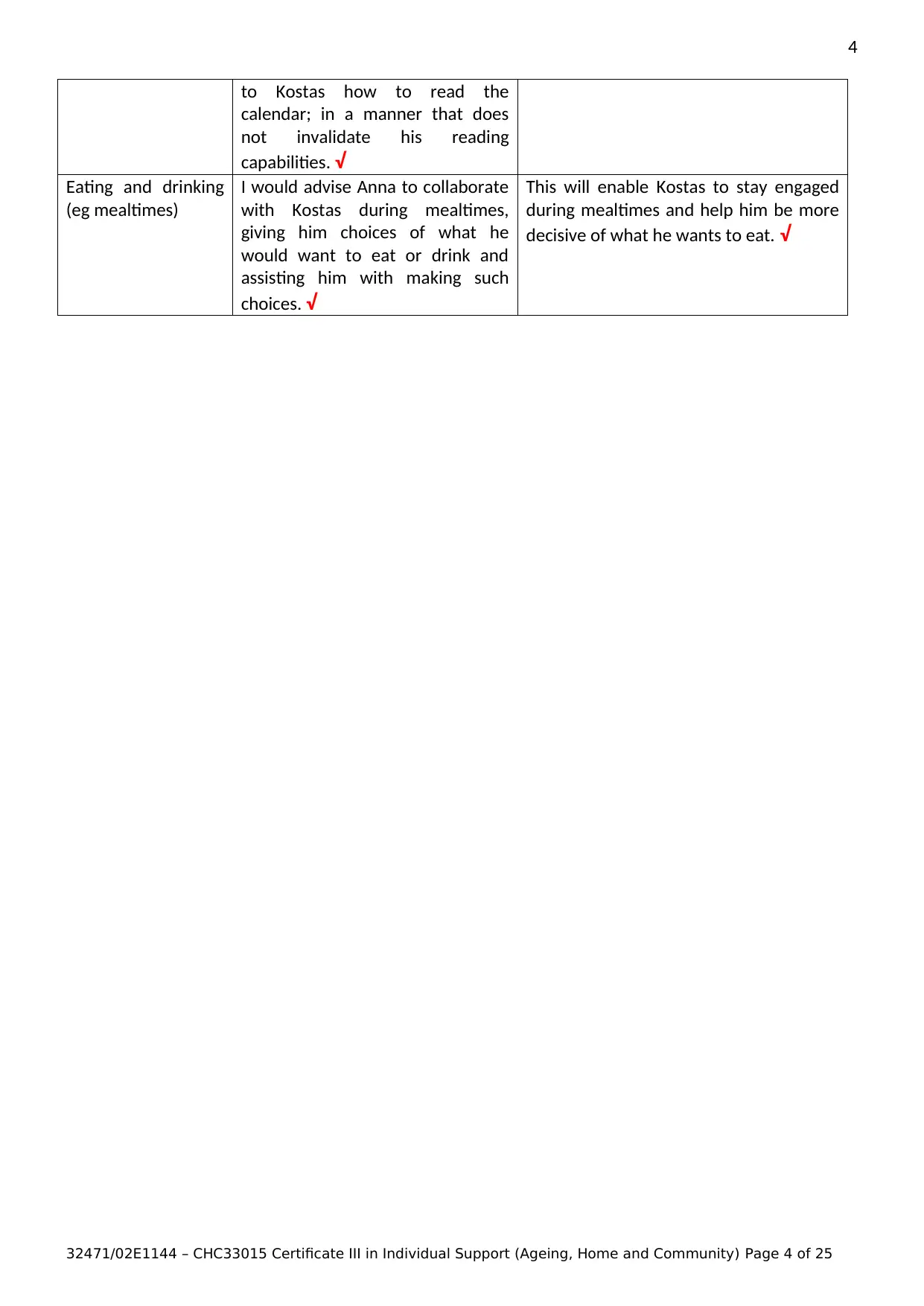
4
to Kostas how to read the
calendar; in a manner that does
not invalidate his reading
capabilities. √
Eating and drinking
(eg mealtimes)
I would advise Anna to collaborate
with Kostas during mealtimes,
giving him choices of what he
would want to eat or drink and
assisting him with making such
choices. √
This will enable Kostas to stay engaged
during mealtimes and help him be more
decisive of what he wants to eat. √
32471/02E1144 – CHC33015 Certificate III in Individual Support (Ageing, Home and Community) Page 4 of 25
to Kostas how to read the
calendar; in a manner that does
not invalidate his reading
capabilities. √
Eating and drinking
(eg mealtimes)
I would advise Anna to collaborate
with Kostas during mealtimes,
giving him choices of what he
would want to eat or drink and
assisting him with making such
choices. √
This will enable Kostas to stay engaged
during mealtimes and help him be more
decisive of what he wants to eat. √
32471/02E1144 – CHC33015 Certificate III in Individual Support (Ageing, Home and Community) Page 4 of 25
Paraphrase This Document
Need a fresh take? Get an instant paraphrase of this document with our AI Paraphraser
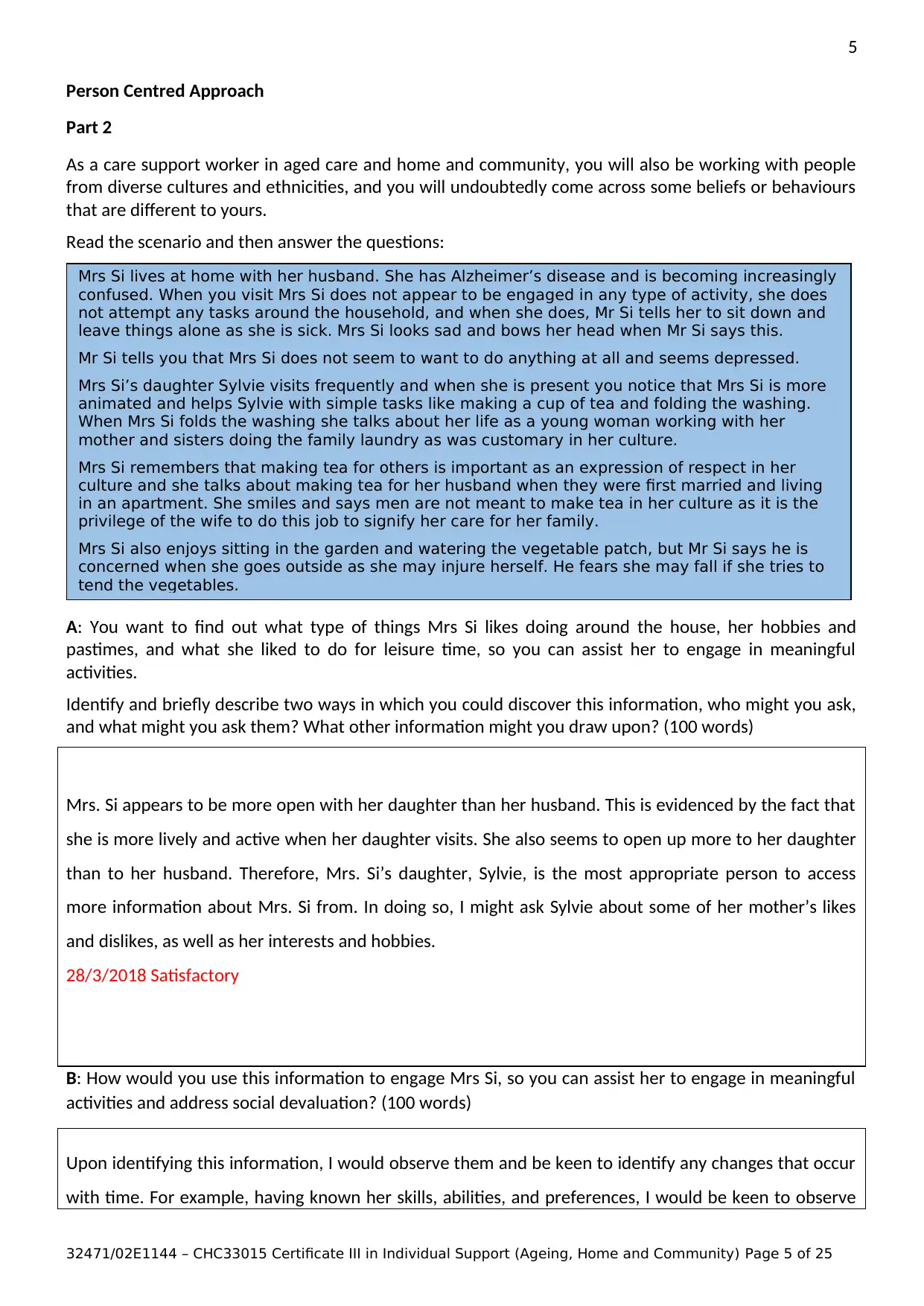
5
Person Centred Approach
Part 2
As a care support worker in aged care and home and community, you will also be working with people
from diverse cultures and ethnicities, and you will undoubtedly come across some beliefs or behaviours
that are different to yours.
Read the scenario and then answer the questions:
A: You want to find out what type of things Mrs Si likes doing around the house, her hobbies and
pastimes, and what she liked to do for leisure time, so you can assist her to engage in meaningful
activities.
Identify and briefly describe two ways in which you could discover this information, who might you ask,
and what might you ask them? What other information might you draw upon? (100 words)
Mrs. Si appears to be more open with her daughter than her husband. This is evidenced by the fact that
she is more lively and active when her daughter visits. She also seems to open up more to her daughter
than to her husband. Therefore, Mrs. Si’s daughter, Sylvie, is the most appropriate person to access
more information about Mrs. Si from. In doing so, I might ask Sylvie about some of her mother’s likes
and dislikes, as well as her interests and hobbies.
28/3/2018 Satisfactory
B: How would you use this information to engage Mrs Si, so you can assist her to engage in meaningful
activities and address social devaluation? (100 words)
Upon identifying this information, I would observe them and be keen to identify any changes that occur
with time. For example, having known her skills, abilities, and preferences, I would be keen to observe
32471/02E1144 – CHC33015 Certificate III in Individual Support (Ageing, Home and Community) Page 5 of 25
Mrs Si lives at home with her husband. She has Alzheimer’s disease and is becoming increasingly
confused. When you visit Mrs Si does not appear to be engaged in any type of activity, she does
not attempt any tasks around the household, and when she does, Mr Si tells her to sit down and
leave things alone as she is sick. Mrs Si looks sad and bows her head when Mr Si says this.
Mr Si tells you that Mrs Si does not seem to want to do anything at all and seems depressed.
Mrs Si’s daughter Sylvie visits frequently and when she is present you notice that Mrs Si is more
animated and helps Sylvie with simple tasks like making a cup of tea and folding the washing.
When Mrs Si folds the washing she talks about her life as a young woman working with her
mother and sisters doing the family laundry as was customary in her culture.
Mrs Si remembers that making tea for others is important as an expression of respect in her
culture and she talks about making tea for her husband when they were first married and living
in an apartment. She smiles and says men are not meant to make tea in her culture as it is the
privilege of the wife to do this job to signify her care for her family.
Mrs Si also enjoys sitting in the garden and watering the vegetable patch, but Mr Si says he is
concerned when she goes outside as she may injure herself. He fears she may fall if she tries to
tend the vegetables.
Person Centred Approach
Part 2
As a care support worker in aged care and home and community, you will also be working with people
from diverse cultures and ethnicities, and you will undoubtedly come across some beliefs or behaviours
that are different to yours.
Read the scenario and then answer the questions:
A: You want to find out what type of things Mrs Si likes doing around the house, her hobbies and
pastimes, and what she liked to do for leisure time, so you can assist her to engage in meaningful
activities.
Identify and briefly describe two ways in which you could discover this information, who might you ask,
and what might you ask them? What other information might you draw upon? (100 words)
Mrs. Si appears to be more open with her daughter than her husband. This is evidenced by the fact that
she is more lively and active when her daughter visits. She also seems to open up more to her daughter
than to her husband. Therefore, Mrs. Si’s daughter, Sylvie, is the most appropriate person to access
more information about Mrs. Si from. In doing so, I might ask Sylvie about some of her mother’s likes
and dislikes, as well as her interests and hobbies.
28/3/2018 Satisfactory
B: How would you use this information to engage Mrs Si, so you can assist her to engage in meaningful
activities and address social devaluation? (100 words)
Upon identifying this information, I would observe them and be keen to identify any changes that occur
with time. For example, having known her skills, abilities, and preferences, I would be keen to observe
32471/02E1144 – CHC33015 Certificate III in Individual Support (Ageing, Home and Community) Page 5 of 25
Mrs Si lives at home with her husband. She has Alzheimer’s disease and is becoming increasingly
confused. When you visit Mrs Si does not appear to be engaged in any type of activity, she does
not attempt any tasks around the household, and when she does, Mr Si tells her to sit down and
leave things alone as she is sick. Mrs Si looks sad and bows her head when Mr Si says this.
Mr Si tells you that Mrs Si does not seem to want to do anything at all and seems depressed.
Mrs Si’s daughter Sylvie visits frequently and when she is present you notice that Mrs Si is more
animated and helps Sylvie with simple tasks like making a cup of tea and folding the washing.
When Mrs Si folds the washing she talks about her life as a young woman working with her
mother and sisters doing the family laundry as was customary in her culture.
Mrs Si remembers that making tea for others is important as an expression of respect in her
culture and she talks about making tea for her husband when they were first married and living
in an apartment. She smiles and says men are not meant to make tea in her culture as it is the
privilege of the wife to do this job to signify her care for her family.
Mrs Si also enjoys sitting in the garden and watering the vegetable patch, but Mr Si says he is
concerned when she goes outside as she may injure herself. He fears she may fall if she tries to
tend the vegetables.

6
changes in these factors to ensure that I customize my care to her according to these changes. Similarly,
understanding the client’s culture and history puts me in a better position to engage with and put her at
ease. Furthermore, I would be showing her that I value the things that matter to her – including her
family and this would be a good way to gain her confidence. This information would also be important in
having frequent reminiscence with Mrs. Si; in an attempt to create a better relationship with her and
gain her trust
28/3/2018 Satisfactory
C: What could you do to assist Mr Si to understand his role as a carer, and where could you refer him to
for assistance and support? (100 words)
To assist Mr. Si understand his role as a caregiver, I would develop a close relationship with him in the
similar way I could do with Mrs. Si, so that I may be able to do and say the things that matter to him in
manner that will put him at ease and be assured that under my care, his wife would be safe. Similarly, I
would try and keep him close enough to understand the challenges that he faces, discussing them and
providing support to help him care for his wife. Referring Mr. Si to a dementia-Based organization woule
also help. In this regard, I would advise Mr. Si to consider contacting Dementia Australia, the Council of
the Aging, or the Aged Care Complaints Scheme (ACCC). Such organizations have a large presence in the
internet and may be ready to help if contacted.
12/4/2018 Well answered. Alzheimer's Australia can also be recommended. Satisfactory
32471/02E1144 – CHC33015 Certificate III in Individual Support (Ageing, Home and Community) Page 6 of 25
changes in these factors to ensure that I customize my care to her according to these changes. Similarly,
understanding the client’s culture and history puts me in a better position to engage with and put her at
ease. Furthermore, I would be showing her that I value the things that matter to her – including her
family and this would be a good way to gain her confidence. This information would also be important in
having frequent reminiscence with Mrs. Si; in an attempt to create a better relationship with her and
gain her trust
28/3/2018 Satisfactory
C: What could you do to assist Mr Si to understand his role as a carer, and where could you refer him to
for assistance and support? (100 words)
To assist Mr. Si understand his role as a caregiver, I would develop a close relationship with him in the
similar way I could do with Mrs. Si, so that I may be able to do and say the things that matter to him in
manner that will put him at ease and be assured that under my care, his wife would be safe. Similarly, I
would try and keep him close enough to understand the challenges that he faces, discussing them and
providing support to help him care for his wife. Referring Mr. Si to a dementia-Based organization woule
also help. In this regard, I would advise Mr. Si to consider contacting Dementia Australia, the Council of
the Aging, or the Aged Care Complaints Scheme (ACCC). Such organizations have a large presence in the
internet and may be ready to help if contacted.
12/4/2018 Well answered. Alzheimer's Australia can also be recommended. Satisfactory
32471/02E1144 – CHC33015 Certificate III in Individual Support (Ageing, Home and Community) Page 6 of 25
⊘ This is a preview!⊘
Do you want full access?
Subscribe today to unlock all pages.

Trusted by 1+ million students worldwide
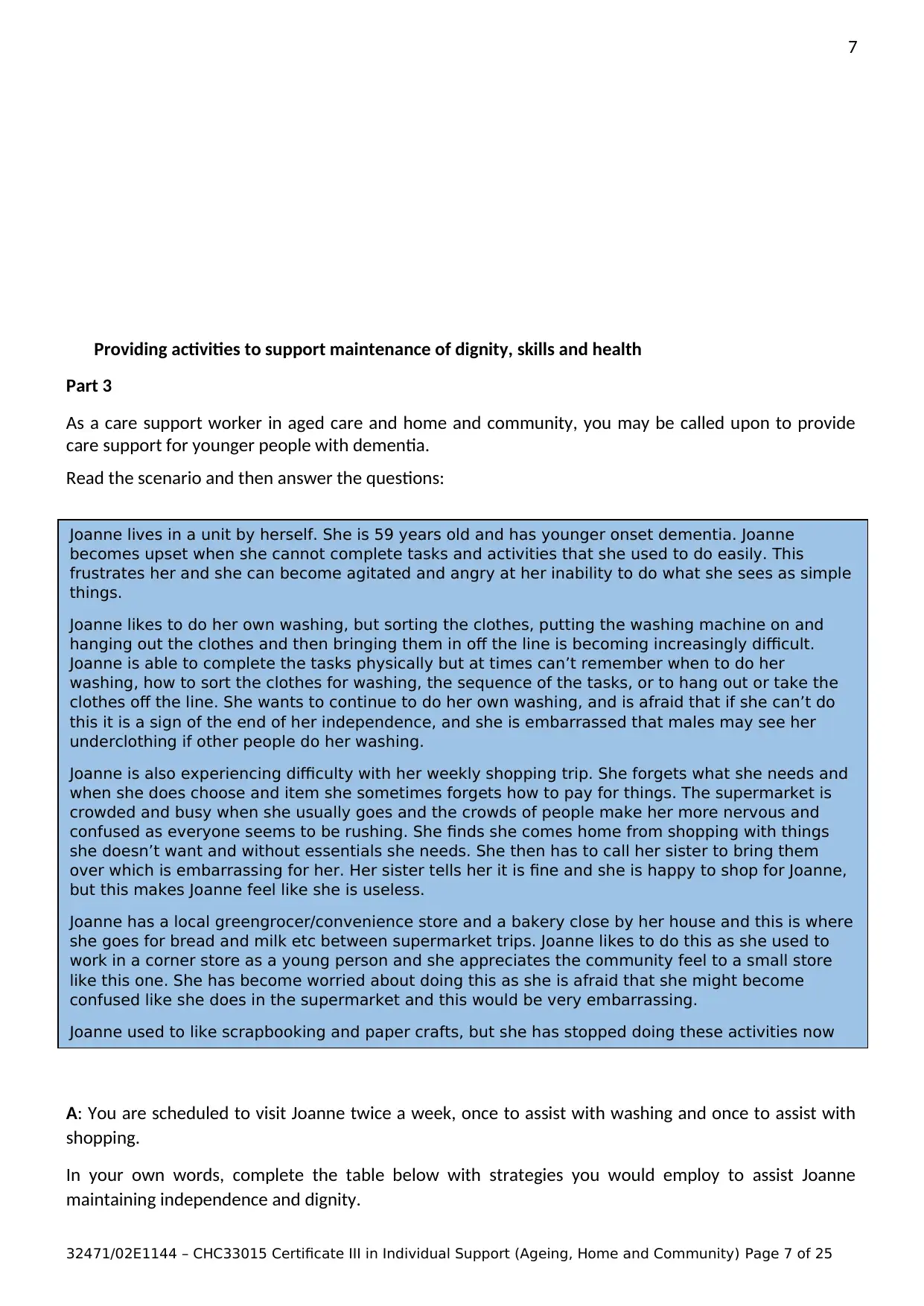
7
Providing activities to support maintenance of dignity, skills and health
Part 3
As a care support worker in aged care and home and community, you may be called upon to provide
care support for younger people with dementia.
Read the scenario and then answer the questions:
A: You are scheduled to visit Joanne twice a week, once to assist with washing and once to assist with
shopping.
In your own words, complete the table below with strategies you would employ to assist Joanne
maintaining independence and dignity.
32471/02E1144 – CHC33015 Certificate III in Individual Support (Ageing, Home and Community) Page 7 of 25
Joanne lives in a unit by herself. She is 59 years old and has younger onset dementia. Joanne
becomes upset when she cannot complete tasks and activities that she used to do easily. This
frustrates her and she can become agitated and angry at her inability to do what she sees as simple
things.
Joanne likes to do her own washing, but sorting the clothes, putting the washing machine on and
hanging out the clothes and then bringing them in off the line is becoming increasingly difficult.
Joanne is able to complete the tasks physically but at times can’t remember when to do her
washing, how to sort the clothes for washing, the sequence of the tasks, or to hang out or take the
clothes off the line. She wants to continue to do her own washing, and is afraid that if she can’t do
this it is a sign of the end of her independence, and she is embarrassed that males may see her
underclothing if other people do her washing.
Joanne is also experiencing difficulty with her weekly shopping trip. She forgets what she needs and
when she does choose and item she sometimes forgets how to pay for things. The supermarket is
crowded and busy when she usually goes and the crowds of people make her more nervous and
confused as everyone seems to be rushing. She finds she comes home from shopping with things
she doesn’t want and without essentials she needs. She then has to call her sister to bring them
over which is embarrassing for her. Her sister tells her it is fine and she is happy to shop for Joanne,
but this makes Joanne feel like she is useless.
Joanne has a local greengrocer/convenience store and a bakery close by her house and this is where
she goes for bread and milk etc between supermarket trips. Joanne likes to do this as she used to
work in a corner store as a young person and she appreciates the community feel to a small store
like this one. She has become worried about doing this as she is afraid that she might become
confused like she does in the supermarket and this would be very embarrassing.
Joanne used to like scrapbooking and paper crafts, but she has stopped doing these activities now
as she has run out of a lot of supplies, and the craft supplies store is on the other side of the city.
Providing activities to support maintenance of dignity, skills and health
Part 3
As a care support worker in aged care and home and community, you may be called upon to provide
care support for younger people with dementia.
Read the scenario and then answer the questions:
A: You are scheduled to visit Joanne twice a week, once to assist with washing and once to assist with
shopping.
In your own words, complete the table below with strategies you would employ to assist Joanne
maintaining independence and dignity.
32471/02E1144 – CHC33015 Certificate III in Individual Support (Ageing, Home and Community) Page 7 of 25
Joanne lives in a unit by herself. She is 59 years old and has younger onset dementia. Joanne
becomes upset when she cannot complete tasks and activities that she used to do easily. This
frustrates her and she can become agitated and angry at her inability to do what she sees as simple
things.
Joanne likes to do her own washing, but sorting the clothes, putting the washing machine on and
hanging out the clothes and then bringing them in off the line is becoming increasingly difficult.
Joanne is able to complete the tasks physically but at times can’t remember when to do her
washing, how to sort the clothes for washing, the sequence of the tasks, or to hang out or take the
clothes off the line. She wants to continue to do her own washing, and is afraid that if she can’t do
this it is a sign of the end of her independence, and she is embarrassed that males may see her
underclothing if other people do her washing.
Joanne is also experiencing difficulty with her weekly shopping trip. She forgets what she needs and
when she does choose and item she sometimes forgets how to pay for things. The supermarket is
crowded and busy when she usually goes and the crowds of people make her more nervous and
confused as everyone seems to be rushing. She finds she comes home from shopping with things
she doesn’t want and without essentials she needs. She then has to call her sister to bring them
over which is embarrassing for her. Her sister tells her it is fine and she is happy to shop for Joanne,
but this makes Joanne feel like she is useless.
Joanne has a local greengrocer/convenience store and a bakery close by her house and this is where
she goes for bread and milk etc between supermarket trips. Joanne likes to do this as she used to
work in a corner store as a young person and she appreciates the community feel to a small store
like this one. She has become worried about doing this as she is afraid that she might become
confused like she does in the supermarket and this would be very embarrassing.
Joanne used to like scrapbooking and paper crafts, but she has stopped doing these activities now
as she has run out of a lot of supplies, and the craft supplies store is on the other side of the city.
Paraphrase This Document
Need a fresh take? Get an instant paraphrase of this document with our AI Paraphraser
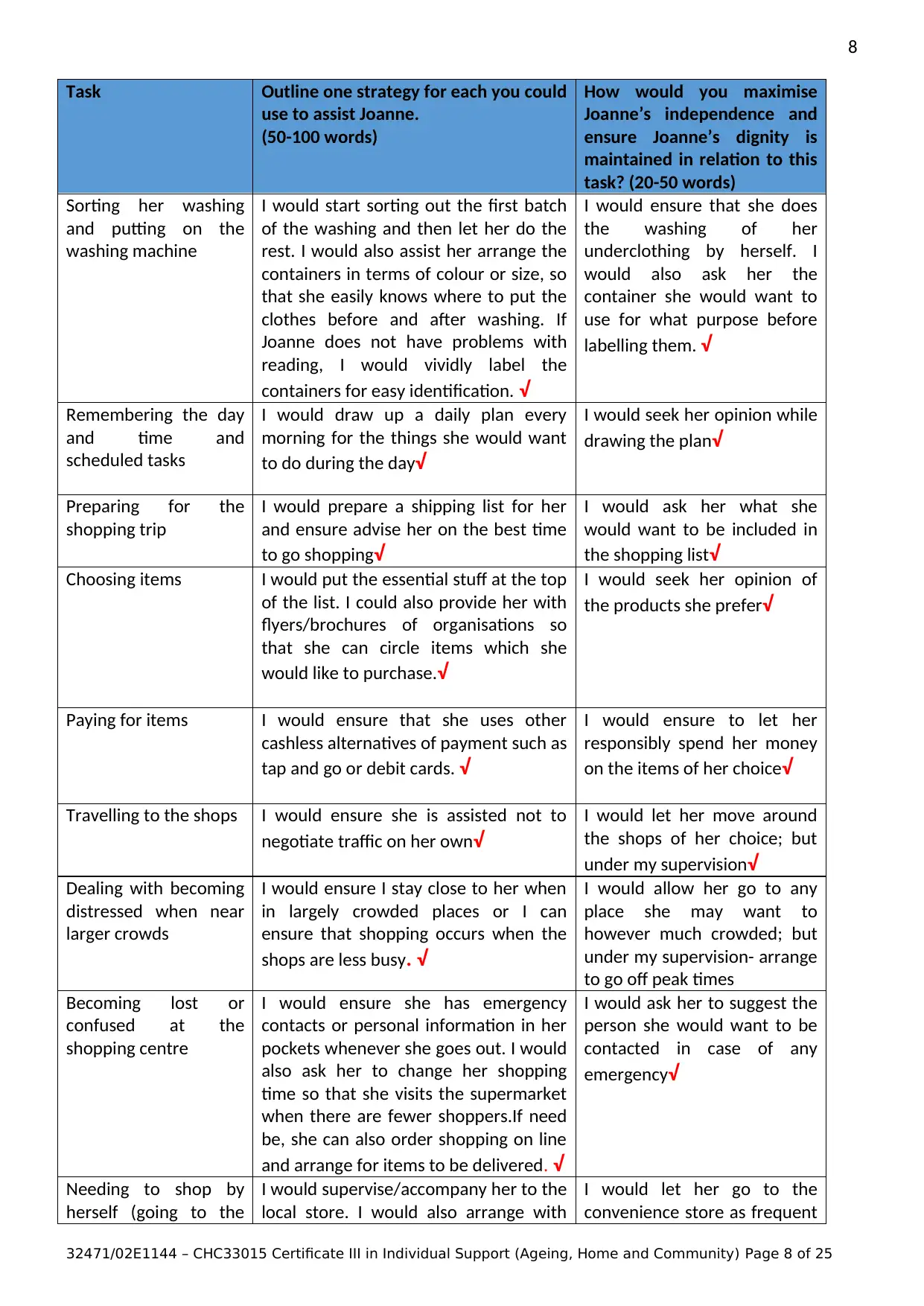
8
Task Outline one strategy for each you could
use to assist Joanne.
(50-100 words)
How would you maximise
Joanne’s independence and
ensure Joanne’s dignity is
maintained in relation to this
task? (20-50 words)
Sorting her washing
and putting on the
washing machine
I would start sorting out the first batch
of the washing and then let her do the
rest. I would also assist her arrange the
containers in terms of colour or size, so
that she easily knows where to put the
clothes before and after washing. If
Joanne does not have problems with
reading, I would vividly label the
containers for easy identification. √
I would ensure that she does
the washing of her
underclothing by herself. I
would also ask her the
container she would want to
use for what purpose before
labelling them. √
Remembering the day
and time and
scheduled tasks
I would draw up a daily plan every
morning for the things she would want
to do during the day√
I would seek her opinion while
drawing the plan√
Preparing for the
shopping trip
I would prepare a shipping list for her
and ensure advise her on the best time
to go shopping√
I would ask her what she
would want to be included in
the shopping list√
Choosing items I would put the essential stuff at the top
of the list. I could also provide her with
flyers/brochures of organisations so
that she can circle items which she
would like to purchase.√
I would seek her opinion of
the products she prefer√
Paying for items I would ensure that she uses other
cashless alternatives of payment such as
tap and go or debit cards. √
I would ensure to let her
responsibly spend her money
on the items of her choice√
Travelling to the shops I would ensure she is assisted not to
negotiate traffic on her own√
I would let her move around
the shops of her choice; but
under my supervision√
Dealing with becoming
distressed when near
larger crowds
I would ensure I stay close to her when
in largely crowded places or I can
ensure that shopping occurs when the
shops are less busy. √
I would allow her go to any
place she may want to
however much crowded; but
under my supervision- arrange
to go off peak times
Becoming lost or
confused at the
shopping centre
I would ensure she has emergency
contacts or personal information in her
pockets whenever she goes out. I would
also ask her to change her shopping
time so that she visits the supermarket
when there are fewer shoppers.If need
be, she can also order shopping on line
and arrange for items to be delivered. √
I would ask her to suggest the
person she would want to be
contacted in case of any
emergency√
Needing to shop by
herself (going to the
I would supervise/accompany her to the
local store. I would also arrange with
I would let her go to the
convenience store as frequent
32471/02E1144 – CHC33015 Certificate III in Individual Support (Ageing, Home and Community) Page 8 of 25
Task Outline one strategy for each you could
use to assist Joanne.
(50-100 words)
How would you maximise
Joanne’s independence and
ensure Joanne’s dignity is
maintained in relation to this
task? (20-50 words)
Sorting her washing
and putting on the
washing machine
I would start sorting out the first batch
of the washing and then let her do the
rest. I would also assist her arrange the
containers in terms of colour or size, so
that she easily knows where to put the
clothes before and after washing. If
Joanne does not have problems with
reading, I would vividly label the
containers for easy identification. √
I would ensure that she does
the washing of her
underclothing by herself. I
would also ask her the
container she would want to
use for what purpose before
labelling them. √
Remembering the day
and time and
scheduled tasks
I would draw up a daily plan every
morning for the things she would want
to do during the day√
I would seek her opinion while
drawing the plan√
Preparing for the
shopping trip
I would prepare a shipping list for her
and ensure advise her on the best time
to go shopping√
I would ask her what she
would want to be included in
the shopping list√
Choosing items I would put the essential stuff at the top
of the list. I could also provide her with
flyers/brochures of organisations so
that she can circle items which she
would like to purchase.√
I would seek her opinion of
the products she prefer√
Paying for items I would ensure that she uses other
cashless alternatives of payment such as
tap and go or debit cards. √
I would ensure to let her
responsibly spend her money
on the items of her choice√
Travelling to the shops I would ensure she is assisted not to
negotiate traffic on her own√
I would let her move around
the shops of her choice; but
under my supervision√
Dealing with becoming
distressed when near
larger crowds
I would ensure I stay close to her when
in largely crowded places or I can
ensure that shopping occurs when the
shops are less busy. √
I would allow her go to any
place she may want to
however much crowded; but
under my supervision- arrange
to go off peak times
Becoming lost or
confused at the
shopping centre
I would ensure she has emergency
contacts or personal information in her
pockets whenever she goes out. I would
also ask her to change her shopping
time so that she visits the supermarket
when there are fewer shoppers.If need
be, she can also order shopping on line
and arrange for items to be delivered. √
I would ask her to suggest the
person she would want to be
contacted in case of any
emergency√
Needing to shop by
herself (going to the
I would supervise/accompany her to the
local store. I would also arrange with
I would let her go to the
convenience store as frequent
32471/02E1144 – CHC33015 Certificate III in Individual Support (Ageing, Home and Community) Page 8 of 25
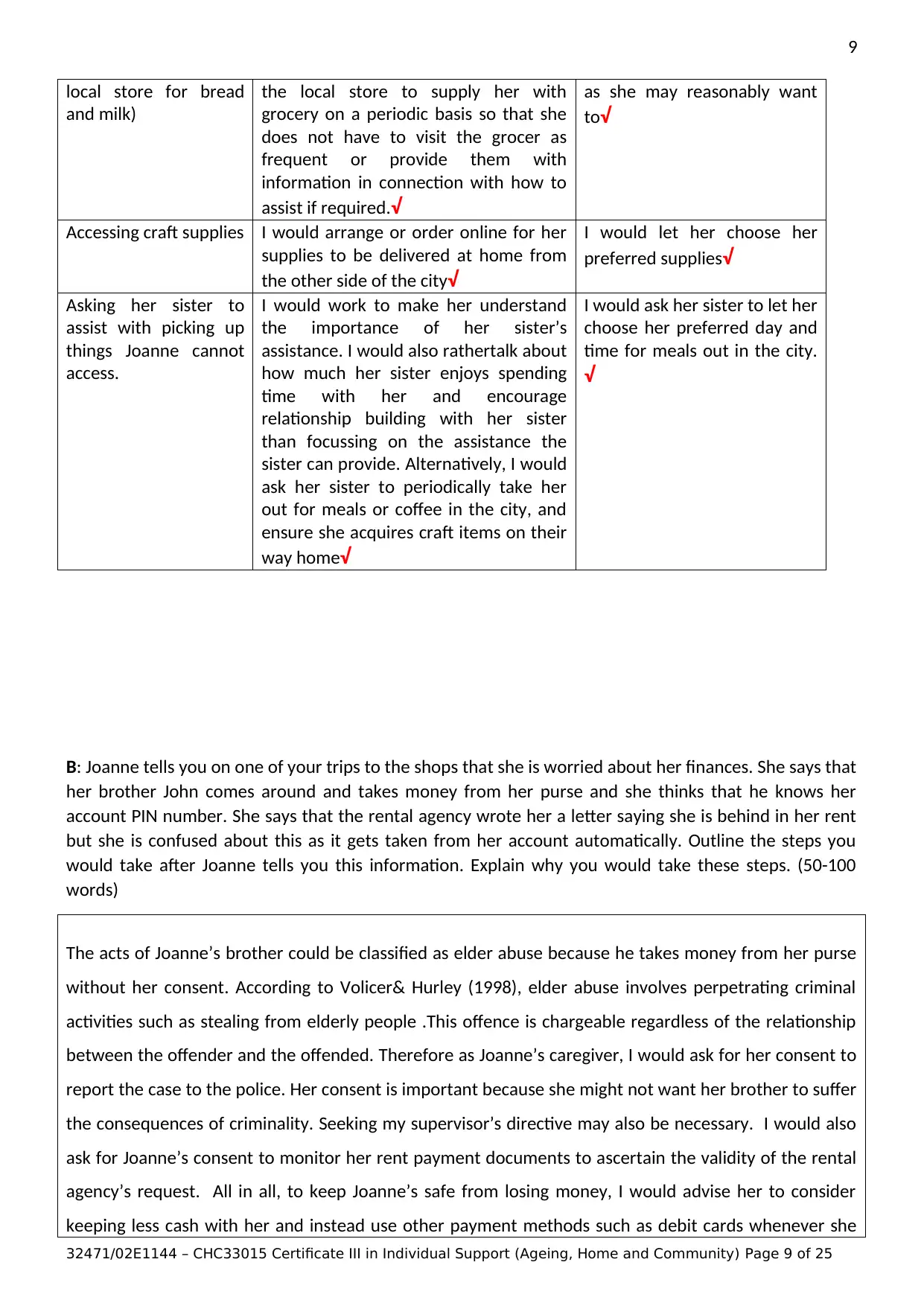
9
local store for bread
and milk)
the local store to supply her with
grocery on a periodic basis so that she
does not have to visit the grocer as
frequent or provide them with
information in connection with how to
assist if required.√
as she may reasonably want
to√
Accessing craft supplies I would arrange or order online for her
supplies to be delivered at home from
the other side of the city√
I would let her choose her
preferred supplies√
Asking her sister to
assist with picking up
things Joanne cannot
access.
I would work to make her understand
the importance of her sister’s
assistance. I would also rathertalk about
how much her sister enjoys spending
time with her and encourage
relationship building with her sister
than focussing on the assistance the
sister can provide. Alternatively, I would
ask her sister to periodically take her
out for meals or coffee in the city, and
ensure she acquires craft items on their
way home√
I would ask her sister to let her
choose her preferred day and
time for meals out in the city.
√
B: Joanne tells you on one of your trips to the shops that she is worried about her finances. She says that
her brother John comes around and takes money from her purse and she thinks that he knows her
account PIN number. She says that the rental agency wrote her a letter saying she is behind in her rent
but she is confused about this as it gets taken from her account automatically. Outline the steps you
would take after Joanne tells you this information. Explain why you would take these steps. (50-100
words)
The acts of Joanne’s brother could be classified as elder abuse because he takes money from her purse
without her consent. According to Volicer& Hurley (1998), elder abuse involves perpetrating criminal
activities such as stealing from elderly people .This offence is chargeable regardless of the relationship
between the offender and the offended. Therefore as Joanne’s caregiver, I would ask for her consent to
report the case to the police. Her consent is important because she might not want her brother to suffer
the consequences of criminality. Seeking my supervisor’s directive may also be necessary. I would also
ask for Joanne’s consent to monitor her rent payment documents to ascertain the validity of the rental
agency’s request. All in all, to keep Joanne’s safe from losing money, I would advise her to consider
keeping less cash with her and instead use other payment methods such as debit cards whenever she
32471/02E1144 – CHC33015 Certificate III in Individual Support (Ageing, Home and Community) Page 9 of 25
local store for bread
and milk)
the local store to supply her with
grocery on a periodic basis so that she
does not have to visit the grocer as
frequent or provide them with
information in connection with how to
assist if required.√
as she may reasonably want
to√
Accessing craft supplies I would arrange or order online for her
supplies to be delivered at home from
the other side of the city√
I would let her choose her
preferred supplies√
Asking her sister to
assist with picking up
things Joanne cannot
access.
I would work to make her understand
the importance of her sister’s
assistance. I would also rathertalk about
how much her sister enjoys spending
time with her and encourage
relationship building with her sister
than focussing on the assistance the
sister can provide. Alternatively, I would
ask her sister to periodically take her
out for meals or coffee in the city, and
ensure she acquires craft items on their
way home√
I would ask her sister to let her
choose her preferred day and
time for meals out in the city.
√
B: Joanne tells you on one of your trips to the shops that she is worried about her finances. She says that
her brother John comes around and takes money from her purse and she thinks that he knows her
account PIN number. She says that the rental agency wrote her a letter saying she is behind in her rent
but she is confused about this as it gets taken from her account automatically. Outline the steps you
would take after Joanne tells you this information. Explain why you would take these steps. (50-100
words)
The acts of Joanne’s brother could be classified as elder abuse because he takes money from her purse
without her consent. According to Volicer& Hurley (1998), elder abuse involves perpetrating criminal
activities such as stealing from elderly people .This offence is chargeable regardless of the relationship
between the offender and the offended. Therefore as Joanne’s caregiver, I would ask for her consent to
report the case to the police. Her consent is important because she might not want her brother to suffer
the consequences of criminality. Seeking my supervisor’s directive may also be necessary. I would also
ask for Joanne’s consent to monitor her rent payment documents to ascertain the validity of the rental
agency’s request. All in all, to keep Joanne’s safe from losing money, I would advise her to consider
keeping less cash with her and instead use other payment methods such as debit cards whenever she
32471/02E1144 – CHC33015 Certificate III in Individual Support (Ageing, Home and Community) Page 9 of 25
⊘ This is a preview!⊘
Do you want full access?
Subscribe today to unlock all pages.

Trusted by 1+ million students worldwide

10
wants to make purchases.
32471/02E1144 – CHC33015 Certificate III in Individual Support (Ageing, Home and Community) Page 10 of 25
wants to make purchases.
32471/02E1144 – CHC33015 Certificate III in Individual Support (Ageing, Home and Community) Page 10 of 25
Paraphrase This Document
Need a fresh take? Get an instant paraphrase of this document with our AI Paraphraser
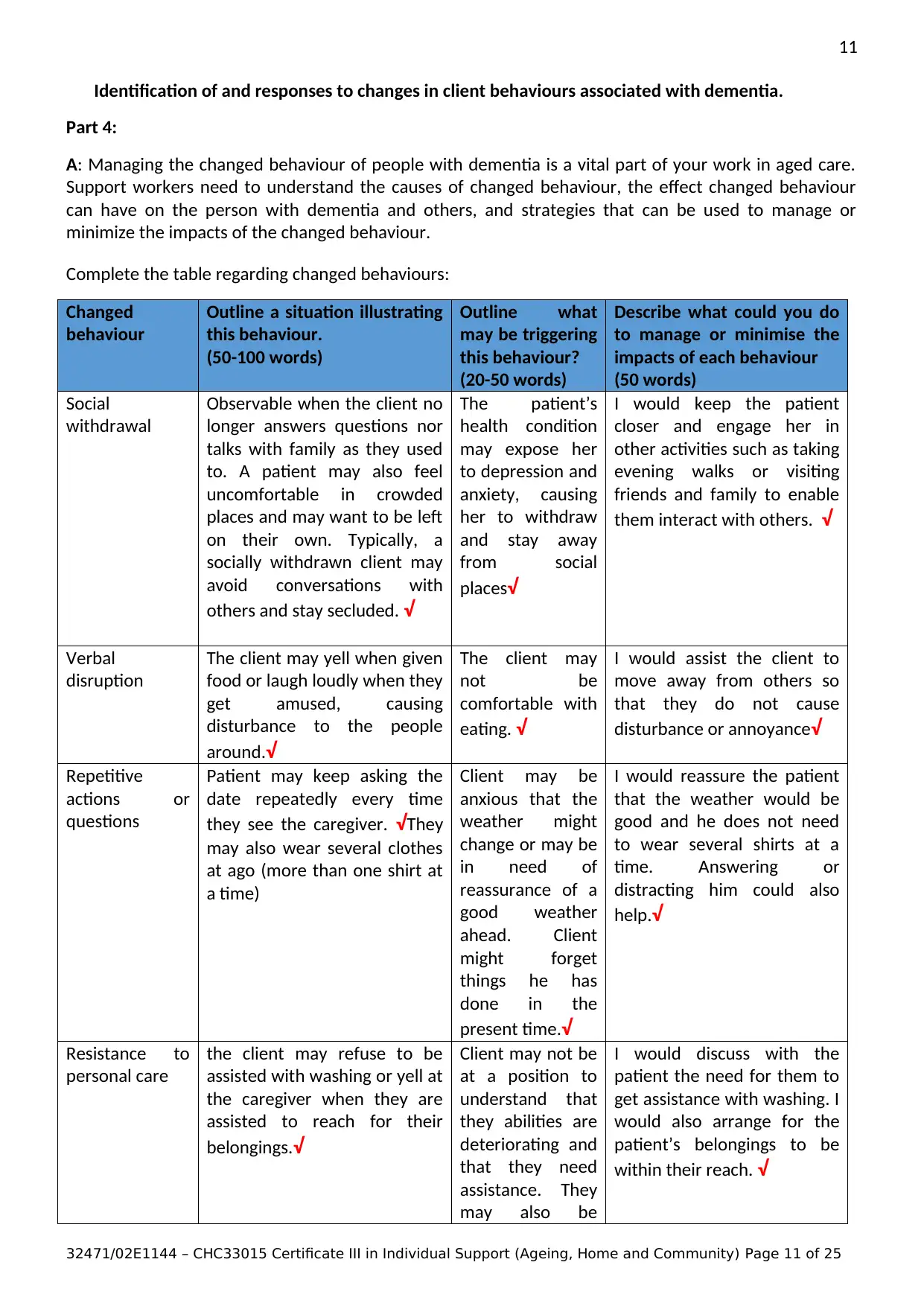
11
Identification of and responses to changes in client behaviours associated with dementia.
Part 4:
A: Managing the changed behaviour of people with dementia is a vital part of your work in aged care.
Support workers need to understand the causes of changed behaviour, the effect changed behaviour
can have on the person with dementia and others, and strategies that can be used to manage or
minimize the impacts of the changed behaviour.
Complete the table regarding changed behaviours:
Changed
behaviour
Outline a situation illustrating
this behaviour.
(50-100 words)
Outline what
may be triggering
this behaviour?
(20-50 words)
Describe what could you do
to manage or minimise the
impacts of each behaviour
(50 words)
Social
withdrawal
Observable when the client no
longer answers questions nor
talks with family as they used
to. A patient may also feel
uncomfortable in crowded
places and may want to be left
on their own. Typically, a
socially withdrawn client may
avoid conversations with
others and stay secluded. √
The patient’s
health condition
may expose her
to depression and
anxiety, causing
her to withdraw
and stay away
from social
places√
I would keep the patient
closer and engage her in
other activities such as taking
evening walks or visiting
friends and family to enable
them interact with others. √
Verbal
disruption
The client may yell when given
food or laugh loudly when they
get amused, causing
disturbance to the people
around.√
The client may
not be
comfortable with
eating. √
I would assist the client to
move away from others so
that they do not cause
disturbance or annoyance√
Repetitive
actions or
questions
Patient may keep asking the
date repeatedly every time
they see the caregiver. √They
may also wear several clothes
at ago (more than one shirt at
a time)
Client may be
anxious that the
weather might
change or may be
in need of
reassurance of a
good weather
ahead. Client
might forget
things he has
done in the
present time.√
I would reassure the patient
that the weather would be
good and he does not need
to wear several shirts at a
time. Answering or
distracting him could also
help.√
Resistance to
personal care
the client may refuse to be
assisted with washing or yell at
the caregiver when they are
assisted to reach for their
belongings.√
Client may not be
at a position to
understand that
they abilities are
deteriorating and
that they need
assistance. They
may also be
I would discuss with the
patient the need for them to
get assistance with washing. I
would also arrange for the
patient’s belongings to be
within their reach. √
32471/02E1144 – CHC33015 Certificate III in Individual Support (Ageing, Home and Community) Page 11 of 25
Identification of and responses to changes in client behaviours associated with dementia.
Part 4:
A: Managing the changed behaviour of people with dementia is a vital part of your work in aged care.
Support workers need to understand the causes of changed behaviour, the effect changed behaviour
can have on the person with dementia and others, and strategies that can be used to manage or
minimize the impacts of the changed behaviour.
Complete the table regarding changed behaviours:
Changed
behaviour
Outline a situation illustrating
this behaviour.
(50-100 words)
Outline what
may be triggering
this behaviour?
(20-50 words)
Describe what could you do
to manage or minimise the
impacts of each behaviour
(50 words)
Social
withdrawal
Observable when the client no
longer answers questions nor
talks with family as they used
to. A patient may also feel
uncomfortable in crowded
places and may want to be left
on their own. Typically, a
socially withdrawn client may
avoid conversations with
others and stay secluded. √
The patient’s
health condition
may expose her
to depression and
anxiety, causing
her to withdraw
and stay away
from social
places√
I would keep the patient
closer and engage her in
other activities such as taking
evening walks or visiting
friends and family to enable
them interact with others. √
Verbal
disruption
The client may yell when given
food or laugh loudly when they
get amused, causing
disturbance to the people
around.√
The client may
not be
comfortable with
eating. √
I would assist the client to
move away from others so
that they do not cause
disturbance or annoyance√
Repetitive
actions or
questions
Patient may keep asking the
date repeatedly every time
they see the caregiver. √They
may also wear several clothes
at ago (more than one shirt at
a time)
Client may be
anxious that the
weather might
change or may be
in need of
reassurance of a
good weather
ahead. Client
might forget
things he has
done in the
present time.√
I would reassure the patient
that the weather would be
good and he does not need
to wear several shirts at a
time. Answering or
distracting him could also
help.√
Resistance to
personal care
the client may refuse to be
assisted with washing or yell at
the caregiver when they are
assisted to reach for their
belongings.√
Client may not be
at a position to
understand that
they abilities are
deteriorating and
that they need
assistance. They
may also be
I would discuss with the
patient the need for them to
get assistance with washing. I
would also arrange for the
patient’s belongings to be
within their reach. √
32471/02E1144 – CHC33015 Certificate III in Individual Support (Ageing, Home and Community) Page 11 of 25
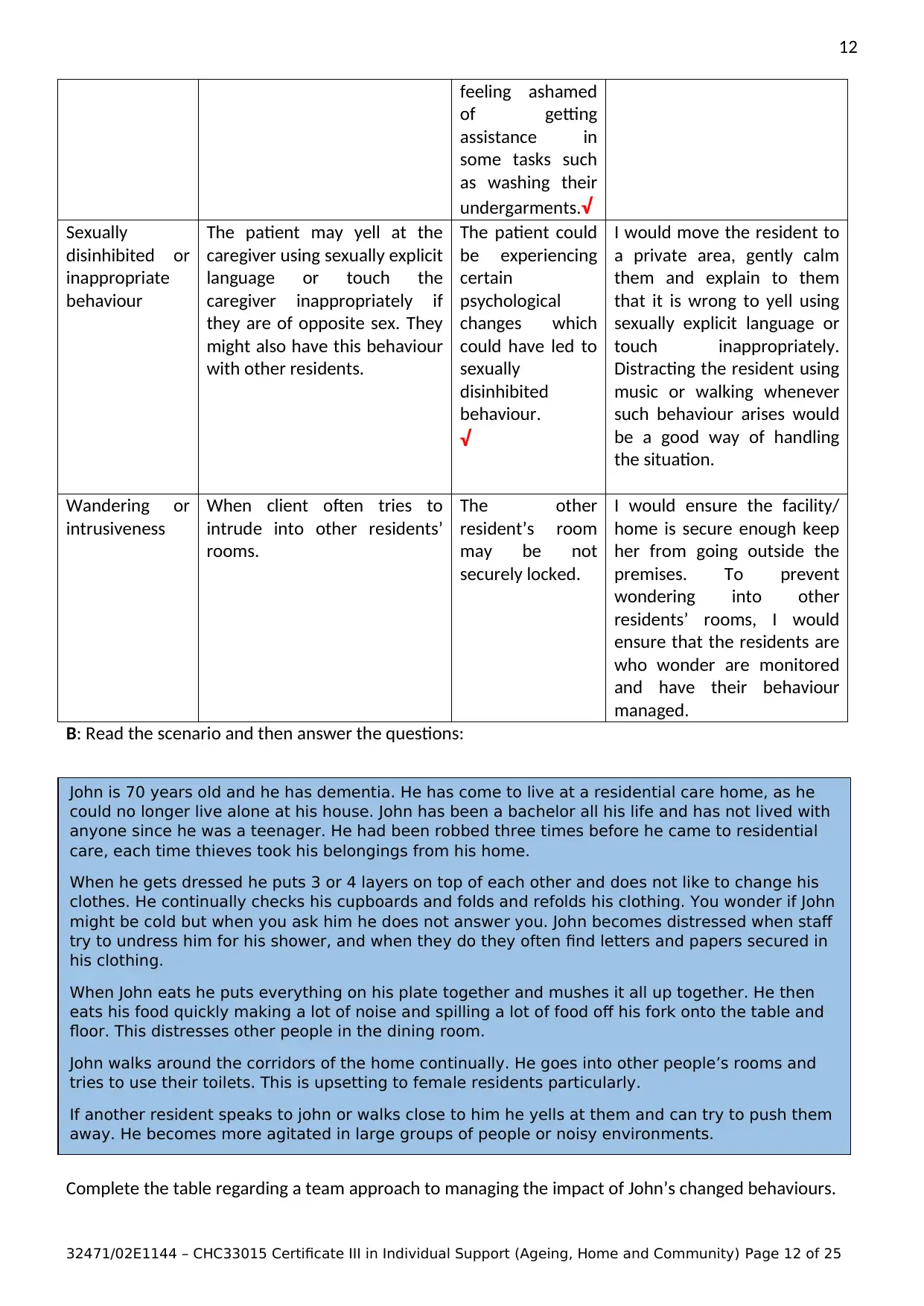
12
feeling ashamed
of getting
assistance in
some tasks such
as washing their
undergarments.√
Sexually
disinhibited or
inappropriate
behaviour
The patient may yell at the
caregiver using sexually explicit
language or touch the
caregiver inappropriately if
they are of opposite sex. They
might also have this behaviour
with other residents.
The patient could
be experiencing
certain
psychological
changes which
could have led to
sexually
disinhibited
behaviour.
√
I would move the resident to
a private area, gently calm
them and explain to them
that it is wrong to yell using
sexually explicit language or
touch inappropriately.
Distracting the resident using
music or walking whenever
such behaviour arises would
be a good way of handling
the situation.
Wandering or
intrusiveness
When client often tries to
intrude into other residents’
rooms.
The other
resident’s room
may be not
securely locked.
I would ensure the facility/
home is secure enough keep
her from going outside the
premises. To prevent
wondering into other
residents’ rooms, I would
ensure that the residents are
who wonder are monitored
and have their behaviour
managed.
B: Read the scenario and then answer the questions:
Complete the table regarding a team approach to managing the impact of John’s changed behaviours.
32471/02E1144 – CHC33015 Certificate III in Individual Support (Ageing, Home and Community) Page 12 of 25
John is 70 years old and he has dementia. He has come to live at a residential care home, as he
could no longer live alone at his house. John has been a bachelor all his life and has not lived with
anyone since he was a teenager. He had been robbed three times before he came to residential
care, each time thieves took his belongings from his home.
When he gets dressed he puts 3 or 4 layers on top of each other and does not like to change his
clothes. He continually checks his cupboards and folds and refolds his clothing. You wonder if John
might be cold but when you ask him he does not answer you. John becomes distressed when staff
try to undress him for his shower, and when they do they often find letters and papers secured in
his clothing.
When John eats he puts everything on his plate together and mushes it all up together. He then
eats his food quickly making a lot of noise and spilling a lot of food off his fork onto the table and
floor. This distresses other people in the dining room.
John walks around the corridors of the home continually. He goes into other people’s rooms and
tries to use their toilets. This is upsetting to female residents particularly.
If another resident speaks to john or walks close to him he yells at them and can try to push them
away. He becomes more agitated in large groups of people or noisy environments.
feeling ashamed
of getting
assistance in
some tasks such
as washing their
undergarments.√
Sexually
disinhibited or
inappropriate
behaviour
The patient may yell at the
caregiver using sexually explicit
language or touch the
caregiver inappropriately if
they are of opposite sex. They
might also have this behaviour
with other residents.
The patient could
be experiencing
certain
psychological
changes which
could have led to
sexually
disinhibited
behaviour.
√
I would move the resident to
a private area, gently calm
them and explain to them
that it is wrong to yell using
sexually explicit language or
touch inappropriately.
Distracting the resident using
music or walking whenever
such behaviour arises would
be a good way of handling
the situation.
Wandering or
intrusiveness
When client often tries to
intrude into other residents’
rooms.
The other
resident’s room
may be not
securely locked.
I would ensure the facility/
home is secure enough keep
her from going outside the
premises. To prevent
wondering into other
residents’ rooms, I would
ensure that the residents are
who wonder are monitored
and have their behaviour
managed.
B: Read the scenario and then answer the questions:
Complete the table regarding a team approach to managing the impact of John’s changed behaviours.
32471/02E1144 – CHC33015 Certificate III in Individual Support (Ageing, Home and Community) Page 12 of 25
John is 70 years old and he has dementia. He has come to live at a residential care home, as he
could no longer live alone at his house. John has been a bachelor all his life and has not lived with
anyone since he was a teenager. He had been robbed three times before he came to residential
care, each time thieves took his belongings from his home.
When he gets dressed he puts 3 or 4 layers on top of each other and does not like to change his
clothes. He continually checks his cupboards and folds and refolds his clothing. You wonder if John
might be cold but when you ask him he does not answer you. John becomes distressed when staff
try to undress him for his shower, and when they do they often find letters and papers secured in
his clothing.
When John eats he puts everything on his plate together and mushes it all up together. He then
eats his food quickly making a lot of noise and spilling a lot of food off his fork onto the table and
floor. This distresses other people in the dining room.
John walks around the corridors of the home continually. He goes into other people’s rooms and
tries to use their toilets. This is upsetting to female residents particularly.
If another resident speaks to john or walks close to him he yells at them and can try to push them
away. He becomes more agitated in large groups of people or noisy environments.
⊘ This is a preview!⊘
Do you want full access?
Subscribe today to unlock all pages.

Trusted by 1+ million students worldwide
1 out of 25
Related Documents
Your All-in-One AI-Powered Toolkit for Academic Success.
+13062052269
info@desklib.com
Available 24*7 on WhatsApp / Email
![[object Object]](/_next/static/media/star-bottom.7253800d.svg)
Unlock your academic potential
Copyright © 2020–2026 A2Z Services. All Rights Reserved. Developed and managed by ZUCOL.





